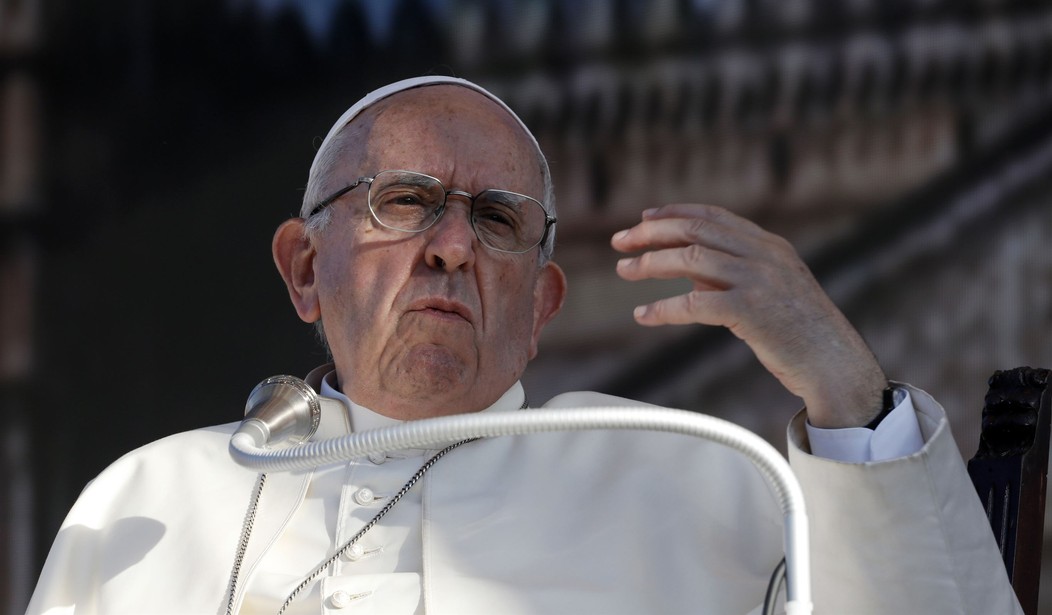Will Pope Francis turn into a “just war” supporter after all? Not quite, but the pontiff moved considerably farther into the Ukraine crisis today — and on Wednesday in a confrontation with Russian Orthodox Patriarch Kirill. Today, Francis called on other nations to provide aid that will allow Ukraine to “defend[] their land,” as well their identity — a pointed rebuke to arguments from Kirill and Vladimir Putin that Ukrainian identity doesn’t exist:
Pope Francis on Friday denounced the “perverse abuse of power” on display in Russia’s war in Ukraine and called for aid to Ukrainians who he said had been attacked in their “identity, history and tradition” and were “defending their land.” …
It came just days after Francis told the head of the Russian Orthodox Church, Patriarch Kirill, that the concept of a “just war” was obsolete since wars are never justifiable and that pastors must preach peace, not politics.
Those comments, during a video call Wednesday with Kirill, seemed to be an indirect jab at the patriarch’s apparent defense of the war. Kirill, who is close to Russian President Vladimir Putin, has seemingly justified the invasion by describing it as part of a struggle against sin and pressure from liberal foreigners to hold “gay parades.” He has blamed the West and a fellow Orthodox patriarch for fomenting enmity between Ukraine and Russia and echoed Putin in insisting they are “one people.”
In his comments Friday, Francis did not mention Russia by name — evidence of the Vatican’s tradition of not identifying aggressors and its attempts to keep open a dialogue with Kirill’s church. But Francis strongly backed Ukraine.
It doesn’t appear that the Holy Father is much concerned with further dialogue with the Patriarch in Moscow. Francis has tried to keep those lines open for the past three-plus weeks as other churches, and even some Russian Orthodox clerics (mainly abroad), took a harder line against Kirill. Signs that the Vatican had begun to lose patience with Kirill emerged late last week as Secretary of State Cardinal Pietro Parolin took the unusual step of openly and explicitly criticizing both Kirill and Russian foreign minister Sergei Lavrov.
However, even that appeared intended to allow Pope Francis to remain above the fray and allow room to act as neutral interlocutor for peace. That policy had drawn criticism for moral ambiguity in a morally clear moment:
Unlike some European nationalists, who have suddenly blanked on Mr. Putin’s name to avoid reminding voters that they belonged to the Russian leader’s fan club, Francis’ motivation stems from his walking a fine line between global conscience, real-world diplomatic player and religious leader responsible for his own flock’s safety.
Nevertheless, some of his own bishops and other supporters within the Roman Catholic Church want him to name names, and historians say the pontiff risks slipping off his high moral ground and into a murky space occupied prominently by Pope Pius XII, the wartime pope who avoided speaking critically of Hitler and the Axis powers as Germany invaded Poland and eventually perpetrated the Holocaust. …
A recent editorial in the National Catholic Reporter, which is usually sympathetic to Francis, urged the pope to call out Mr. Putin. “Whatever is happening behind the scenes, it is time for Francis to speak the truth about the murderous assault on Ukraine,” it said, adding, “It is time to call things as they are. This is Putin’s war and it is evil.”
The Vatican didn’t much care for that charge, coming from the firmly progressive Reporter, and made that much clear on Monday. “Francis has been subject of criticism from those who hope that in his public statements he would explicitly name Vladimir Putin and Russia,” read the Andrea Tornelli’s response in L’Osservatore Romano, “as if the words of the pastor of the universal church should reflect the sound bites of a television news program.” Tornelli, the editorial director for the Vatican’s Dicastery of Communications, also fumed that popes do not name aggressors “not out of cowardice or an excess of diplomatic prudence, but in order not to close the door, in order to always leave open a crack to the possibility of stopping the evil and saving human lives.”
True enough, but a couple of points are now clear that make this somewhat moot. First, the war has been conducted so brutally and with clear targeting of civilian populations for purposes of terror and genocide that its moral evil sets it apart even from other military clashes. Second, Kirill’s complicity in Putin’s naked aggression and genocidal ambitions against Ukrainians can no longer be ignored, and that dashes any hope of Kirill’s use as a moderating force on Putin. Even the alternate to that conclusion — that Kirill and the Russian Orthodox Church are essentially hostages to Putin — doesn’t improve anything. Either Kirill is an apostate or he’s a moral coward, but either way he’s worthless.
With that much now concluded, there isn’t much point in attempting to keep focus on Kirill’s potential interest in ecclesial peace, the long game Pope Francis has played since their 2016 meeting in Havana. Despite the huffiness Tornelli displayed at the beginning of the week, it appears that the pontiff has just about arrived at the Reporter’s conclusion — and doesn’t see much point in hiding it.
Earlier this week on my podcast, I spoke with my friend and veteran Vaticanista Francis X. Rocca of the Wall Street Journal about this very point. He’s first up, but stick around for Andrew Malcolm and David Harsanyi too.








Join the conversation as a VIP Member